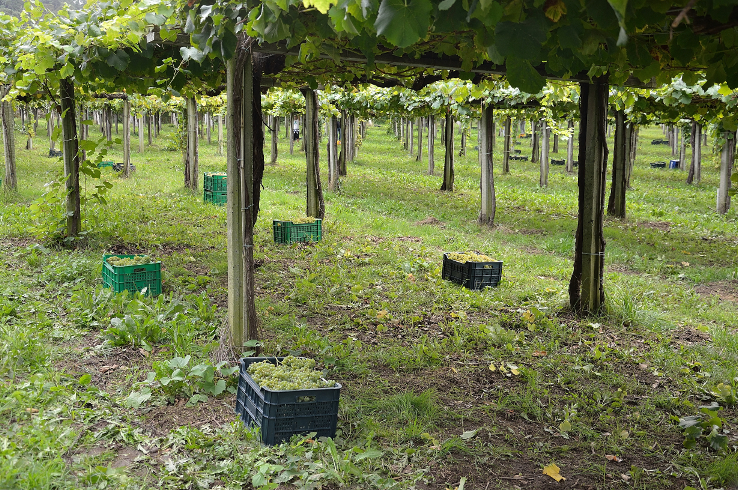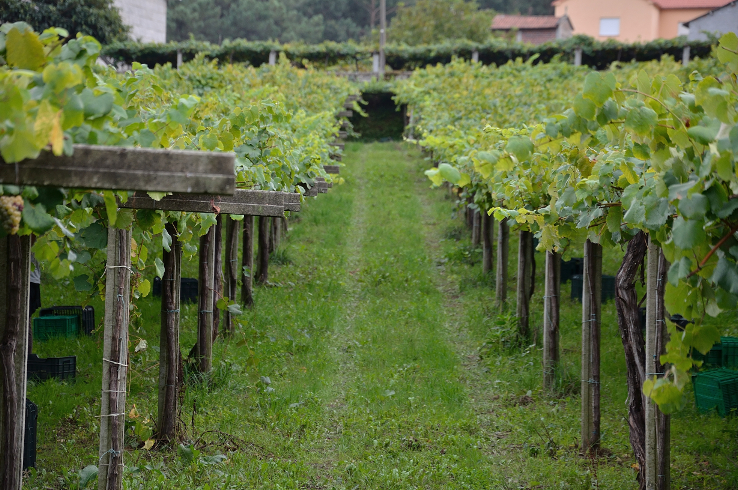2020 Viña Cartin Rías Baixas Albariño
Quintessential is the only word I can use to describe this wine. It comes from the ancestral home of Albariño, located directly on Spain’s Atlantic coast. It’s bright and refreshing… a solid weeknight staple.
Sustainable farming practices and hand-harvested.
- Tasting Notes Meyer lemon, clementine, citrus pith, honeydew, white grapefruit, marcona almond, sea salt
- Variety Albariño
- Region Spain, Rias Baixas
- Volume 750ml
- Alcohol Volume 13%
- Table Talk This wine comes from Val do Salnés, which many call the birthplace of Albariño.
Viña Cartín was founded in 1977 in Spain’s Salnés Valley, the oldest of Rias Baixas’ five subregions. In 2003, Viña Cartín moved their operations to a new location—an old winery in the heart of the area—and refurbished its interior with modern technology, yet maintained the estate’s artisanal character.
Contrary to the many regional wineries who purchase fruit, Viña Cartin proudly owns and sustainably farms 50 acres of their own vines. This direct access to the source allows them to control the raw material from start to finish. The estate’s vines average 30 years in age and benefit from the influence of the nearby Atlantic ocean. The resulting wines are bright, balanced, and laden with natural acidity.
ALBARINO
A pleasantly refreshing light white wine. Most known from Rias Baixas in Spain, but additionally as Vinho Verde in Portugal. Albariño’s are generally high in acid with refreshing citrus fruit flavors and a notably saline mineral character due to the regions’ proximity to the ocean. Serve these wines well-chilled while eating fish tacos on a hot summer day, you won’t be disappointed.
GALICIA, SPAIN
Part of what can be referred to as “Green” Spain, Galicia is located in the upper north west corner of the country. Wine production here dates back to the time of the Romans. It is one of the coolest areas producing refreshingly crisp Albariño with strong mineral characteristics as well as elegant red wine from the Mencía grape. Galicia boasts five denominated wine regions (DOs) including the infamous Rías Baixas, the closest DO to the Atlantic ocean.
Related Items
-
2022 Bachelet-Monnot Maranges ‘La Fussiere’ Blanc Premier Cru
$75.00Fruit for this 1er cru White Burgundy comes from the highest vineyard site in Maranges (avg. 30 years in age). This is a sneaky premier cru that I think would keep an eye on. It may be the best valued Burgundy on the market.
Organic farming practices, hand-harvested, native yeast fermentation and aged for 12 months in barrel.
-
2022 Domaine Trotereau ‘Château de Quincy’
$32.00This wine was sourced from vineyards that come with a unique terroir of sandy, silex, and pink limestone soils… unlike any other Sauvignon Blanc appellation in the world. The combination produces a wine that is beautifully ripe, round, textured, lush, and full of complex aromas. These wines are capable of aging quite gracefully!
Lutte Raisonneé farming, indigenous yeast fermentation, raised in stainless steel & enamel tanks, wine does not underage malolactic conversion.
-
New Arrival
2024 Argaux Santa Ynez Valley Sauvignon Blanc
$30.00When we set out to create a Sauvignon Blanc, we had a clear vision: it had to be crisp, vibrant, effortlessly drinkable, and versatile enough to pair with just about anything. This bottle checks every box—and then some. Crafted by the incredibly talented Ernst Storm, it’s a wine that balances precision with pure pleasure. Bright, refreshing, and seriously delicious, this is the kind of Sauvignon Blanc you’ll keep reaching for.
Sustainable farming practices and hand-harvested at night to retain freshness. The wine was fermented cold in 100% stainless steel and aged on the lees for 6 months for added mouthfeel.
-
2022 Storm Presqu’ile Vineyard Pinot Noir
$58.00This Pinot Noir is shaped by brisk Pacific winds, ancient marine soils, and one of the longest growing seasons in California. It’s cool-climate Pinot at its best and is meant to be enjoyed with a slight chill, just as the sun is setting and the grill is going—cedar-plank salmon, charred leeks, broccolini, wild mushrooms, and a farro salad.
Organic farming practices, native yeast fermentation, neutral oak aging, family-owned, less than 500 cases produced.









